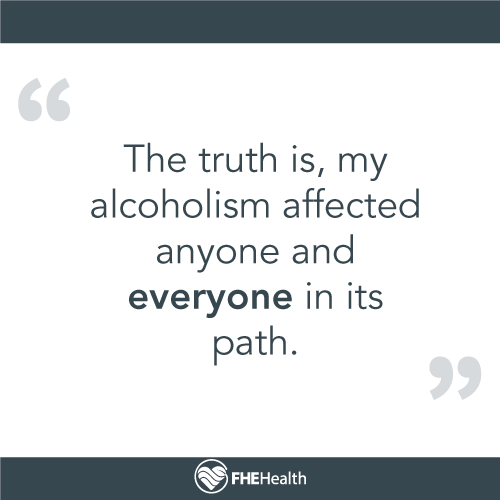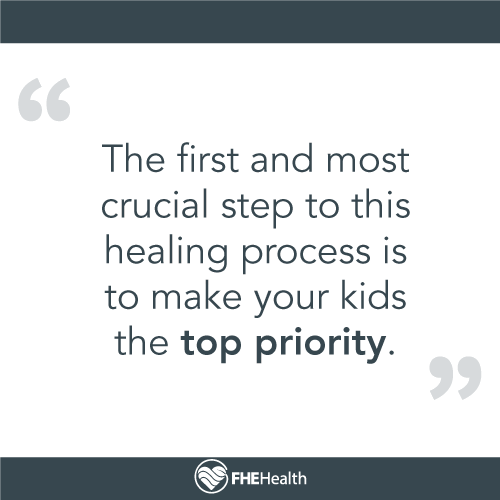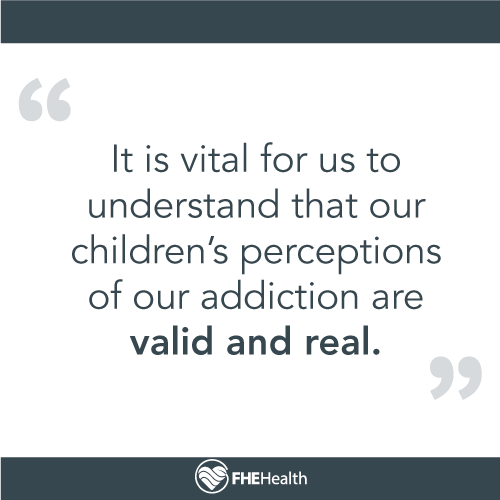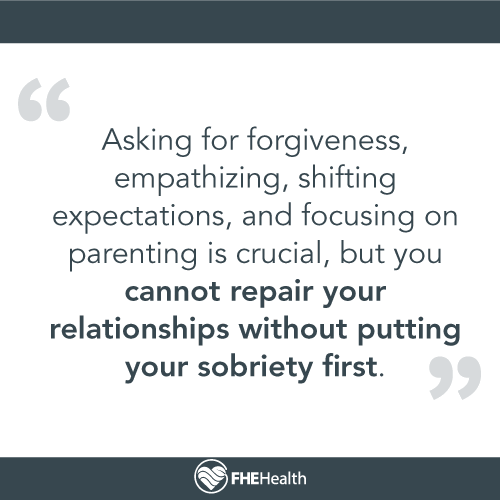
Addiction is a chronic disease that negatively affects the individual struggling as well as destroying every relationship in its path. One of the most heart-wrenching casualties of the battle with addiction is the trail of damaged relationships with children left in its wake. With proper treatment and professional help, mending broken relationships with your children – in recovery – is possible.
Addiction: A Family Disease
 A friend once told me: “You will never fully comprehend the magnitude of the harms you caused your family.” Naturally, my alcoholic brain scoffed at the idea that MY use harmed anyone other than myself. What an absolute delusion that was. The truth is, my alcoholism affected anyone and everyone in its path. Most specifically, the harms I caused my son were the absolute worst and continue to be the hardest living amends I’ve had to make.
A friend once told me: “You will never fully comprehend the magnitude of the harms you caused your family.” Naturally, my alcoholic brain scoffed at the idea that MY use harmed anyone other than myself. What an absolute delusion that was. The truth is, my alcoholism affected anyone and everyone in its path. Most specifically, the harms I caused my son were the absolute worst and continue to be the hardest living amends I’ve had to make.
At no fault of his own, my son witnessed the worst of my addiction. Truth be told, my son was caught in between the crossfires of my battle with substance abuse – an innocent bystander wounded by the enemy. From my emotional absence to the chaos of my less than organized lifestyle, this disease is one that has plagued my family for many generations before me. Yet again, the cunning, baffling, powerful nature of my disease beckoned for my servitude, and I obliged. As a child of an alcoholic, I swore to myself I would never be that mom.
Eventually, I faced the possibility of losing custody of my son for good or finally surrendering myself to an entirely new way of life. By the grace of God, I accepted help and entered a dual diagnosis treatment program at FHE Health. I was finally educated on the disease of addiction and introduced me to a 12 Step Fellowship that ultimately saved my life. Through the 12 Steps, I began to take a more in-depth look into the harm I caused others – most specifically, the hurt I caused my son. After looking at the wreckage of my past – with my sponsor – I was able to finally look at how I could begin to mend my relationship with my son. This has been by far the most challenging and most fruitfully rewarding experience I’ve had throughout my sobriety. Here are a few tips for other parents – in recovery – trying to mend relationships with your children:
Focus on Your Children
 The first and most crucial step to this healing process is to make your kids the top priority. This requires us to make space to spend quality time with our children. Before the reunion with my son, I was living without any intention of setting up a life him. I am naturally driven by selfishness, and my priorities revolved around myself. While actively drinking and drugging, I only had one priority in mind – oblivion. Upon my son coming to live with me, I had to take a long, hard look at what kind of mother he deserved. My son deserves a present mother. He deserves a mother that will put him first and spend quality time. I will never be able to get back the time lost to my ravaging addiction, but I have the opportunity to make living amends by setting my phone down, putting all distractions aside, and remaining completely present in the moments I spend with him. Life can be hectic, busy, and stressful, but showing my son, he is my top priority is the most important step I can take in the direction of healing.
The first and most crucial step to this healing process is to make your kids the top priority. This requires us to make space to spend quality time with our children. Before the reunion with my son, I was living without any intention of setting up a life him. I am naturally driven by selfishness, and my priorities revolved around myself. While actively drinking and drugging, I only had one priority in mind – oblivion. Upon my son coming to live with me, I had to take a long, hard look at what kind of mother he deserved. My son deserves a present mother. He deserves a mother that will put him first and spend quality time. I will never be able to get back the time lost to my ravaging addiction, but I have the opportunity to make living amends by setting my phone down, putting all distractions aside, and remaining completely present in the moments I spend with him. Life can be hectic, busy, and stressful, but showing my son, he is my top priority is the most important step I can take in the direction of healing.
Let Go of Expectations
Trust is earned over time and cannot be forced. My son loved me, but he struggled with believing I wasn’t going to leave him again periodically. Can I blame him? During his younger years, experience showed him that I was not reliable. I remember my son telling me one day, “Mom I remember one night we went to bed together then when I woke up I was going to Texas with Papa. Why didn’t you kiss me goodbye?” I remember this conversation hitting me right in the chest. With a huge lump in my throat, holding back tears, I remember trying to explain my fears in having to say goodbye to him while not knowing exactly when I’d see him again. From the perspective of an innocent little boy, he felt complete abandonment. I had to accept that this was going to take time to mend. There is no timeline for healing the wreckage of our past. We must seek forgiveness without being emotionally dependent on a relationship to be healed overnight. “Expectations are premeditated resentments.”
Have Compassion for Their Perceptions

Regardless of your child’s age, you must have compassion for their perceptions. After all, their perception is their reality. Most kids are very impressionable and vulnerable to their environment and the changes within the household caused by our addiction. As I mentioned before, I never knew my son felt abandoned when I didn’t kiss him goodbye before heading off to treatment. In my mind, it would’ve been much harder to try and bid my farewells with no idea of when we’d see one another again. In his three-year-old mind – Mommy left and didn’t care enough even to say goodbye. It would be ignorant to assume our addiction did not affect our children. Our children may recognize and also appreciate our efforts to stay sober; however, this does not negate their pain or reverse their horrible experiences. It is vital for us to understand that our children’s perceptions of our addiction are valid and real.
Make Proper Amends to Your Children

It is crucial that we seek counsel before making amends to our children. We must be delicate and genuine when we approach our children about the harms we caused them during the chaos of our addiction. It is vital that we educate our children on the disease of addiction, and we remain transparent while appropriately taking specific responsibility for the harms we caused them. From my experience, my son didn’t care much about the “I’m sorry.” He wanted to know “why” and “how” I was going to make changes. I gave him space and respect to talk to me about how my addiction impacted him. Once he addressed these things, I asked him how I could make things better. If you think mending relationships with other adults in your life will be tough, sit down with your rigorously honest child and ask them how you can make things better. My son had a long list of defects I needed to change and very specific requests. Make sure to explain to your child that you will never be perfect, but you will do your very best to make changes in the areas that can promote you being the best parent to him/her.
Put Your Sobriety First
The most critical step of making living amends with your children is to prioritize your sobriety. I’m sure you’ve heard it said many times, “What you put before your sobriety, you will lose.” Asking for forgiveness, empathizing, shifting expectations, and focusing on parenting is crucial, but you cannot repair your relationships without putting your sobriety first. Without maintaining a forthright program of recovery, attempting to mend relationships can be an act of futility. The only way we can truly mend our relationships with our children is to abandon ourselves entirely to the healing process of recovery.






